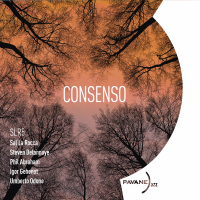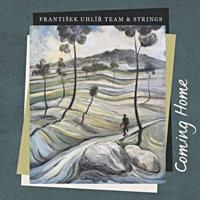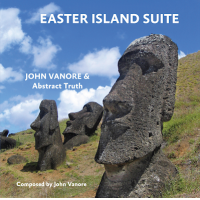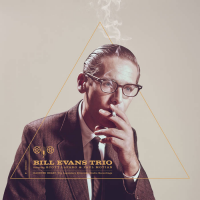Home » Jazz Articles » Multiple Reviews » Steven Bernstein: Evaluating The Diaspora Series
Steven Bernstein: Evaluating The Diaspora Series
 Trumpeter/composer/bandleader Steven Bernstein may have made his name with groups as far-flung as Sex Mob and the Lounge Lizards, but it is quite possible that his most enduring work, the effort that will be most remembered when people look back at a long and fruitful career, is his series of Diaspora recordings on John Zorn's Tzadik label and its Radical Jewish Culture imprint. By taking traditional Jewish music and reworking it in a variety of contexts, Bernstein has demonstrated just how malleable the music is. From the Cuban and soul inflections of Diaspora Soul ('99) to the blues-informed but never obvious Diaspora Blues ('02) to his latest release, the West Coast cool influence of Diaspora Hollywood ('04), Bernstein demonstrates that music is truly universal, and can be moulded and shaped an infinite number of ways to make music that is both timely and timeless.
Trumpeter/composer/bandleader Steven Bernstein may have made his name with groups as far-flung as Sex Mob and the Lounge Lizards, but it is quite possible that his most enduring work, the effort that will be most remembered when people look back at a long and fruitful career, is his series of Diaspora recordings on John Zorn's Tzadik label and its Radical Jewish Culture imprint. By taking traditional Jewish music and reworking it in a variety of contexts, Bernstein has demonstrated just how malleable the music is. From the Cuban and soul inflections of Diaspora Soul ('99) to the blues-informed but never obvious Diaspora Blues ('02) to his latest release, the West Coast cool influence of Diaspora Hollywood ('04), Bernstein demonstrates that music is truly universal, and can be moulded and shaped an infinite number of ways to make music that is both timely and timeless. Bernstein explains it best in his liner notes to Diaspora Soul : "When John Zorn asked me to make a record for the Radical Jewish Culture series, I was left with an enigmatic question. How does a Jewish musician who has spent his life studying 'other' musical cultures make a 'Jewish' record? How does one make a 'Jewish' record when, by nature, all of one's music is already Jewish?"
The answer was simple: just follow one's musical instincts. "All of my records," says Bernstein, "are an actual 'record' of an event, a snapshot of my music at that moment, with those particular musicians in that particular space." So, rather than looking too hard, being too considered, Bernstein simply followed his impulses and looked to approach a more traditional Jewish songbook with whatever interests he happened to be engaged in at that particular point in time.
 Steven Bernstein
Steven Bernstein
Diaspora Soul
Tzadik
1999
At the time of Diaspora Soul Bernstein had been thinking about the sound of three tenor saxophones and a baritone. "I call it the Little Richard sound," explains Bernstein, "you see that set-up in early pictures of his band." But equally, Bernstein had been studying New Orleans music, and how it developed into not just jazz as we know it, but rhythm and blues. And how that sound was part of a larger sound that took in the Gulf Coast sound, specifically Texas, Cuba and, of course, Miami, where displaced Jews and Cubans intermingled and were exposed to each others' music.
The resulting record seamlessly blends traditional Jewish hora form with Cuban cha cha, no surprise since the hora's bass pattern is the first half of the clave, which is the root of Afro-Cuban music. From reinterpreting "Manishtana," which are the four questions asked by the youngest child at the Passover Seder, as a New Orleans cha-cha, to the soul-dripped version of "Let My People Go," which features the horn section of Paul Shapiro, Michael Blake and Peter Apfelbaum on tenors, and Briggan Krauss on baritone, as well as Brian Mitchell's Wurlitzer piano, Bernstein manages to blend styles into something that is reverential to all yet creates something refreshingly new. "Roumania, Roumania" features a Jim Keltner-esque drum beat, courtesy of percussionist Roberto Juan Rodriguez, who has been mining his own confluence of Cuban and Jewish traditions on his own Tzadik releases, most notably his recently-released Baila! Gitano Baila! . Add Ry Cooder and you just might find a Tex Mex connection in there somewhere. And "Rock of Ages," with its combination of bongo rhythms, Hammond organ and blue notes, takes a popular Chanukah song and refashions it in the spirit of Donny Hathaway.
Diaspora Soul is unquestionably the most approachable of the three disks, with danceable grooves, catchy arrangements and singable melodies abounding. Still, while there was a lot of preparation work involved, there was, as is Bernstein's habit, little to no rehearsal and most of the tracks are first takes. But when it came time to tackle another Diaspora project, Bernstein was characteristically uninterested in repeating past successes. "Each recording represents what I was hearing in my head at the time of the recording," Bernstein says. "It represents the way I wanted to play and write at that time - it fulfilled my need to also hear that music; each recording I've made has been a recording that I wanted to hear as well as record."
 Steven Bernstein
Steven Bernstein
Diaspora Blues
Tzadik
2002
For Diaspora Blues , Bernstein wanted to "arrange less and play more trumpet, but I was not interested in using a 'New York' rhythm section - I felt there were enough recordings like that. Sex Mob was in Florida doing a double bill with [saxophonist] Sam Rivers, and when I heard his trio play, I knew these were the guys I wanted to record with. Sam did it as a favour to me. I never dreamed that Sam would record a whole CD — I was hoping he would guest on one song — but Sam is such a generous artist that he wanted to play the music.
And so, armed with a band whose approach is considerably more free than the ensemble that recorded Diaspora Soul , Bernstein recorded Diaspora Blues , which may be somewhat misleading to listeners expecting a more overt blues record, with traditional Jewish music meshed around blues forms. There are no straightforward blues forms to be found on the record — although the mood and many of the notes are distinctly blue in tone and ambience.
More playful and improvisational in nature, Diaspora Blues finds Bernstein and Rivers enmeshed in collective improvisation, supported by the elastic rhythm section of bassist Doug Matthews and drummer Anthony Cole. That Matthews and Cole also double on bass clarinet and tenor saxophone respectively broadens the sonic palette, including a woodwind/brass quartet version of the traditional prayer "Aveenu Malkenu." Sounding a bit like the World Saxophone Quartet, the piece shifts between strict arrangement and more fluid improv.
Another differentiator between Diaspora Soul and Diaspora Blues is the amount of writing Bernstein did for the album. Nearly half the material is composed by Bernstein, although in the case of pieces like "Commentary I" and "Commentary II" they are so exploratory that it would appear that Bernstein's contributions are in the form of simple sketches, roadmaps given to the group as jumping-off point for more extended extemporization. Still, between the material composed by Cantor Moshe Koussevitsky, "whose voice, music and spirit guided this project," says Bernstein, the traditional material and Bernstein's own compositions including "Lucky," where Rivers' mellifluous flute drives the entire piece, there is a consistent ambience that is intrinsically darker than the more groove-happy Diaspora Soul.
 Steven Bernstein
Steven Bernstein
Diaspora Hollywood
Tzadik
2004
Sitting somewhere between the approachable Diaspora Soul and the mysterious Diaspora Blues , Bernstein's latest offering, Diaspora Hollywood is inspired by, as Bernstein recounts, "listening to Shorty Rogers, Shelly Manne and Jimmy Giuffre. I'd been fascinated by the LA arrangers from the '50s and '60s, I wanted to figure out how they achieved those sounds. I'm lucky to have great friends in LA who are incredible musicians, and I've been waiting to record with [percussionist] Danny [Frankel] and [saxophonist] Pablo [Calogero] in this kind of situation for years, so the ensemble was obvious."
There's a certain film noire aesthetic about the record, which also features D.J. Bonebrake on vibraphone and bassist David Piltch. The material ranges from the rhythmical insistence of Bernstein's "King Kong" to the cooler vibe of "Havenu Shalom Alechum" and Bernstein's "Hollywood Diaspora," with its late-night ambience. Calogero works the bottom range of all his instruments - baritone sax, bass clarinet and bass flute, to create a rich texture that is reminiscent, not surprisingly, of Gerry Mulligan.
This is music that manages to be both ethereal and rooted at the same time. "Jehudas Bas Zion," with its light funk groove and Calogero's bass clarinet, is ominous yet strangely compelling. "Sim Shalom," with its dark and smoky feel, translates a traditional piece that is more commonly heard at an up-tempo pace into something that could be an outtake from Miles Davis' soundtrack to Ascenseur pour l'éschafaud.
What becomes immediately apparent upon sampling the disk aside, Bernstein actually articulates in the liner notes that he quite intentionally combined the improvisational style of Diaspora Blues with the more through-composed approach of Diaspora Soul , resulting in a heady mix that is the best of both worlds. Consequently, Diaspora Hollywood may be the most fully-realized and successful of the three disks and, if there is any justice, will show up on many critics' top ten lists for '04.
Whether or not Bernstein continues with the Diaspora series, there is no question that he has created a trilogy of music that manages to successfully blend Jewish themes, both traditional and inspired, with a variety of musical situations, proving that, indeed, context is everything. And that even such seemingly straightforward titles as Soul , Blues and Hollywood can have broader meaning, implications that extend beyond the obvious into more intriguing combinations of music from a variety of sources. Bernstein, with the Diaspora series, has created some of the most memorable music to come from Zorn's Radical Jewish Culture imprint proving, in no uncertain terms, that there is a wealth of possibility in interpreting this music. Far more than mere shtick, fusing music from a variety of cultures only enriches all its sources, and Bernstein's Diaspora series does nothing if not enhancing all its reference points.
Related Article
Artist Profile (2003)
Related Website
www.sexmobmusic.com
Photo Credit
Mark Wohlrab
Tags
PREVIOUS / NEXT
Steven Bernstein Concerts
Support All About Jazz
 All About Jazz has been a pillar of jazz since 1995, championing it as an art form and, more importantly, supporting the musicians who make it. Our enduring commitment has made "AAJ" one of the most culturally important websites of its kind, read by hundreds of thousands of fans, musicians and industry figures every month.
All About Jazz has been a pillar of jazz since 1995, championing it as an art form and, more importantly, supporting the musicians who make it. Our enduring commitment has made "AAJ" one of the most culturally important websites of its kind, read by hundreds of thousands of fans, musicians and industry figures every month.




















